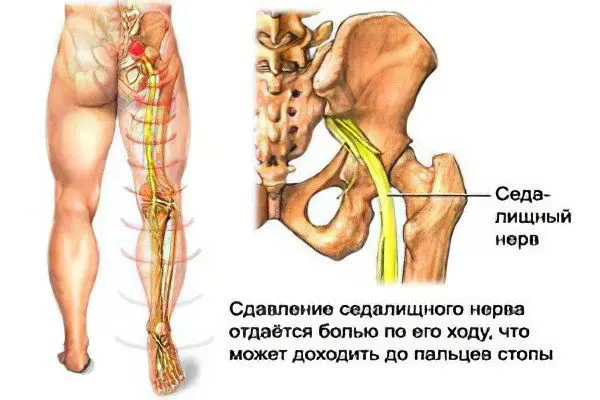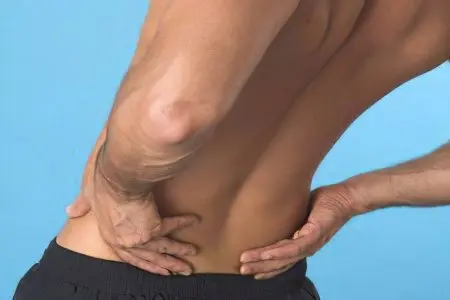Contents
What is a pinched nerve?
A pinched nerve occurs when the nerve roots that extend from the spinal cord are compressed by neighboring vertebrae or other “obstacles”, including: hernia, spasmodic muscles, tendons, cartilage, tumors, protrusion.
A pinched nerve is always accompanied by severe pain (stabbing, burning, shooting). There are many forms of pinching, but the most common are pinching of the cervical and sciatic nerves.
Depending on the location of the pinched nerve and localization of pain, sciatica (pain in the sacrum, buttock, back of the leg), lumboischialgia (pain in the lower back, buttock, back of the leg), lumbalgia (pain in the lower back and back), cervicobrachialgia (pain in neck and arm) and cervicalgia (neck pain).
It is important to consider that a person experiencing an acute attack of pain may additionally suffer from numbness of a certain muscle group, from disruption of the organs. It depends on which of the nerves was pinched. It is necessary to distinguish between clamping of sensory, autonomic and motor nerves. When the first of them suffers, the person turns to the doctor because of a severe attack of pain that cannot be endured. When the last two types of nerves are pinched, medical care is often delayed, which is fraught with the development of serious complications.
Symptoms of a pinched nerve

The symptoms of a pinched nerve depend on the location of the pinched nerve. Affects the manifestation of the disease and the inflammatory process (if present), the causes of pinching and its duration (degree).
The main symptom is a sharp pain at the site of pinching (lower back, neck, back, arm or leg) and limited movement. Severe cases of pinched cervical, sciatic, or spinal nerves can lead to compression of the spinal cord, impair motor function and sensation in the limbs, and cause paresis or paralysis.
Signs of a pinched nerve and their endings will vary depending on what caused this condition. Also, the severity and nature of the symptoms are affected by what functions the nerve is responsible for and where it is located.
Therefore, the following signs of pinching can be distinguished:
Pinching of the sciatic nerve or nerve in the lower back (sciatica) is manifested by burning and tingling that radiates to the leg. She, in turn, becomes inactive, and in a standing position, a person feels shooting pain. In the presence of a hernia or prolapse, the pain becomes more intense and sharp. If the pinched nerve becomes inflamed, it is called sciatica. Often, a pinched nerve in the lower back can be caused by being overweight, because it is in the lumbar region that the main weight of the body falls. When an intervertebral hernia or an exacerbation of osteochondrosis becomes the cause of pinching, herbal medicine and therapeutic exercises are recommended, and manual therapy is excluded.
When a pinched cervical nerve is characterized by tension in the muscles of the neck. The pain increases significantly if a person tries to turn his head or, on the contrary, keeps it in the same position for a long time (during sleep, with prolonged sitting, etc.) Intervertebral discs or cervical vertebrae can pinch the cervical nerve in case of osteochondrosis, subluxation or prolapse (protrusion). For the treatment of such pinching, massage and manual therapy are best suited, which can relieve a person of pain and restore the normal anatomical position of the intervertebral discs.
If the sensory nerve is affected, then the person experiences pain of varying intensity. It can be burning, shooting, stabbing in nature. It may occur intermittently, or it may be permanent.
When the nerve is compressed in the thoracic region, the person suffers from intercostal neuralgia. If the vegetative part of the nervous system is subjected to compression in the same place, then patients often complain of heart pain. To distinguish a pinched nerve from heart disease, you should pay attention to the nature of the pain. As a rule, with intercostal neuralgia, they are present on an ongoing basis, they do not subside either during rest or during active pastime. Strengthening of symptoms occurs when you try to feel the space between the ribs and perform body movements.
In the event that the sciatic nerve is compressed, patients complain of pain in the lower back, which radiate to the lower extremities, buttocks and can reach the heels.
When the radial nerve suffers, the person is not able to straighten and bend the arm, the fingers are in a bent state, and the hand hangs limply. Symptoms vary from site to site.
With compression of the ulnar nerve, the sensitivity of the fingers and hand is disturbed. Blood circulation suffers, pain is given to the little finger.
Often, no matter which nerve is affected, the compression site becomes swollen, red, and painful.
Muscle cramps and weakness at the site of pinching. The occurrence of a tingling sensation.
Symptoms that characterize a pinched nerve tend to intensify during a night’s rest. The same thing happens with a strong cough, laughter, sneezing, and even just with increased excitement. With numbness of the limbs, the pain may fade somewhat. Hypothermia, on the contrary, leads to increased pain.
Causes of a pinched nerve

Most often, a pinched nerve occurs due to an exacerbation of osteochondrosis (degeneration of the cartilage of the intervertebral discs): the gap between the vertebrae narrows and the nerve branches are pinched. Hypertonicity (spasm) of the muscles only exacerbates the pathological process, giving the person even more discomfort.
When spasmodic muscles pinch nerves, blood vessels are also affected. This not only causes pain, but also impairs blood circulation, the functioning of internal organs and the brain. If the pinching lasts for a long time, the nerve tissue may die and the sensitivity of certain parts of the body and skin may disappear. Sometimes a pinched nerve can become inflamed. In particular, this happens with sciatica.
Other causes of pinched nerves include:
An awkward movement done with too much speed and abruptness.
A sharp load on any part of the spine, after a long stay at rest.
Any kind of injury – bruises, falls, dislocations, fractures, subluxations, etc.
Defects of the spine, congenital and acquired.
Recovery period after any operation.
Disturbances in the hormonal sphere.
Diseases of an infectious nature.
Osteochondrosis of the spine and complications of this disease, such as hernia and protrusion of discs.
Muscle spasm due to many reasons.
Displacement of the vertebrae.
Overweight.
A growing tumor that can be localized anywhere.
There are additional risk factors that lead to the fact that a pinched nerve occurs in a person more often than in other people: this is a hereditary predisposition, increased physical activity, poor posture, female gender, the period of gestation.
What to do with a pinched nerve?
If you suspect a pinched nerve, you should seek help from a medical institution. Self-treatment using folk remedies can only aggravate the situation and lead to the development of complications. The doctor will be able to understand the causes that led to the occurrence of compression to determine the tactics of treatment. It is important to strictly adhere to the recommendations given by the doctor.
Knowing how a pinched nerve is diagnosed will help you feel more confident at the doctor’s appointment.
Treating a pinched nerve

First of all, the doctor must accurately establish the diagnosis. For this, an MRI of the area that the person complains about is most often used. Sometimes an X-ray examination is performed, which makes it possible to visualize pinched nerves in any part of the spine. X-rays are used for suspected nerve compression by bones, and MRI for suspected nerve compression by soft tissues. In addition, it allows you to determine the condition of the internal organs and the presence of complications that could appear when a nerve is pinched.
Most often, the treatment of a pinched nerve is not difficult, and its results appear after the first treatment session. For treatment, acupuncture, manual therapy and acupressure Tibetan massage are used. Thanks to this, it is possible to quickly relieve muscle spasms, restore the correct position of the intervertebral discs, release pinched nerve endings and eliminate pain.
The general principles of the treatment of nerves subjected to compression are reduced to the fact that a person needs to relieve pain, and only after that they eliminate the cause of such a condition. If necessary, a person is operated on.
As for pain relief, both drug and non-drug treatments are used. The most common group of drugs for relieving pain from pinched nerves is NSAIDs. They allow not only to lower the threshold of pain sensitivity, but also to reduce the existing inflammation. However, NSAIDs have serious side effects, and first of all, it is the ability to irritate the mucous membrane lining the stomach. Therefore, it is important to use drugs in this group when taken orally only after meals. In addition, NSAIDs should not be used for a long time and exceed the dosage, as this leads to an increase in all side effects.
If the doctor diagnosed that the pinched nerve was caused by muscle spasm (lumbago), then other medicines, such as mydocalm, should be used to relieve it. Physiotherapy such as UHF, electrophoresis, a course of acupuncture, novocaine blockades, and massage help to eliminate pain.
The most effective auxiliary methods are magnetotherapy, electrophoresis, paraffin applications. Do not forget about therapeutic exercises, the complexes are selected in accordance with the cause that caused the nerve compression.
The intake of vitamin complexes, in particular vitamins of group B, will help normalize metabolic processes in the body.
If it is not possible to immediately go to the doctor’s office, then if you suspect a pinched nerve, you should take an anesthetic and lay the person on a flat, hard surface. After that, you should call a medical worker at home or take the victim to the hospital on your own.
It should be understood that a pinched nerve is not a temporary state of the body that can go away on its own. Even after the pain has been eliminated, the cause of the pinching must be found out. In the absence of a therapeutic effect, compression of the nerves can lead to serious complications and the need for surgical intervention.
The structure of the nervous system is very complex, so self-medication is unacceptable. Therapy should be carried out only by a neurologist.










გამარჯობათ ათი დღეა მტკივა საჯდომი ნევრი და ცალ ფეხში დაჭიმული მაქს ნევრი ნემსები ვიკეთე და შედეგები არ მომცა